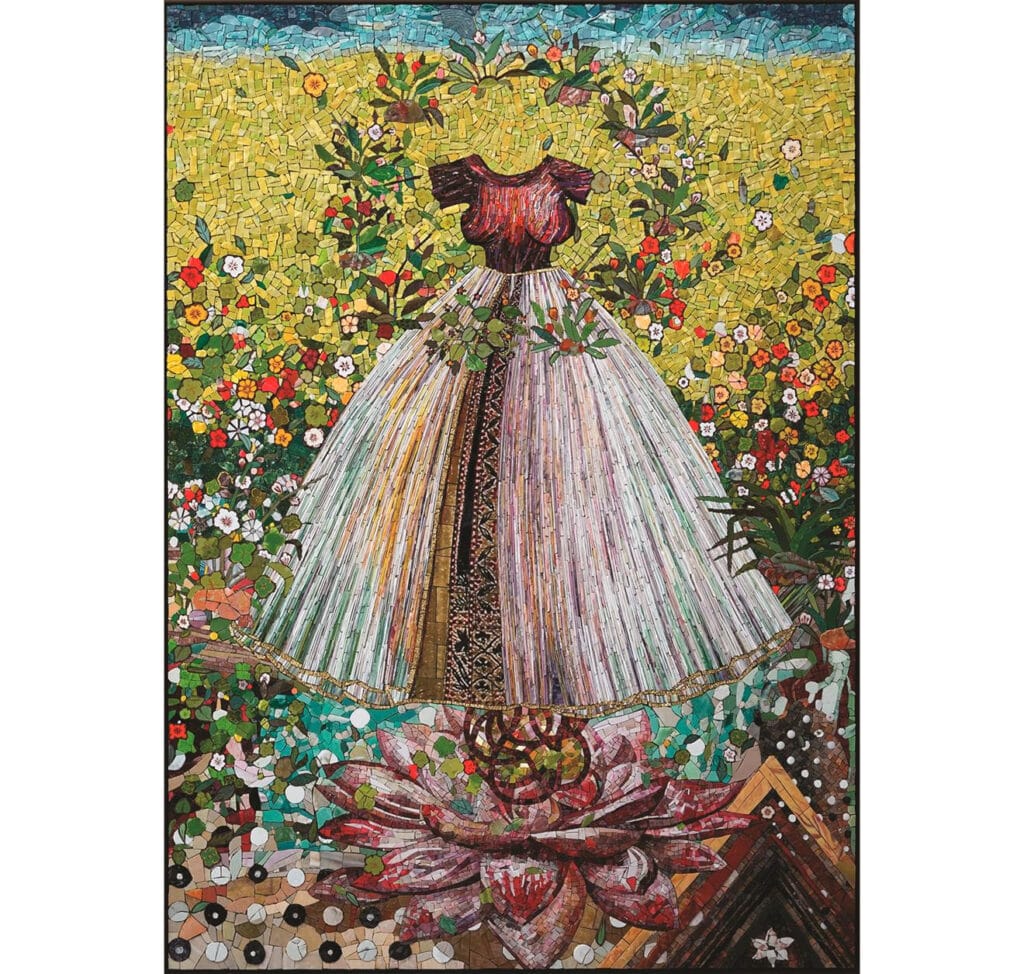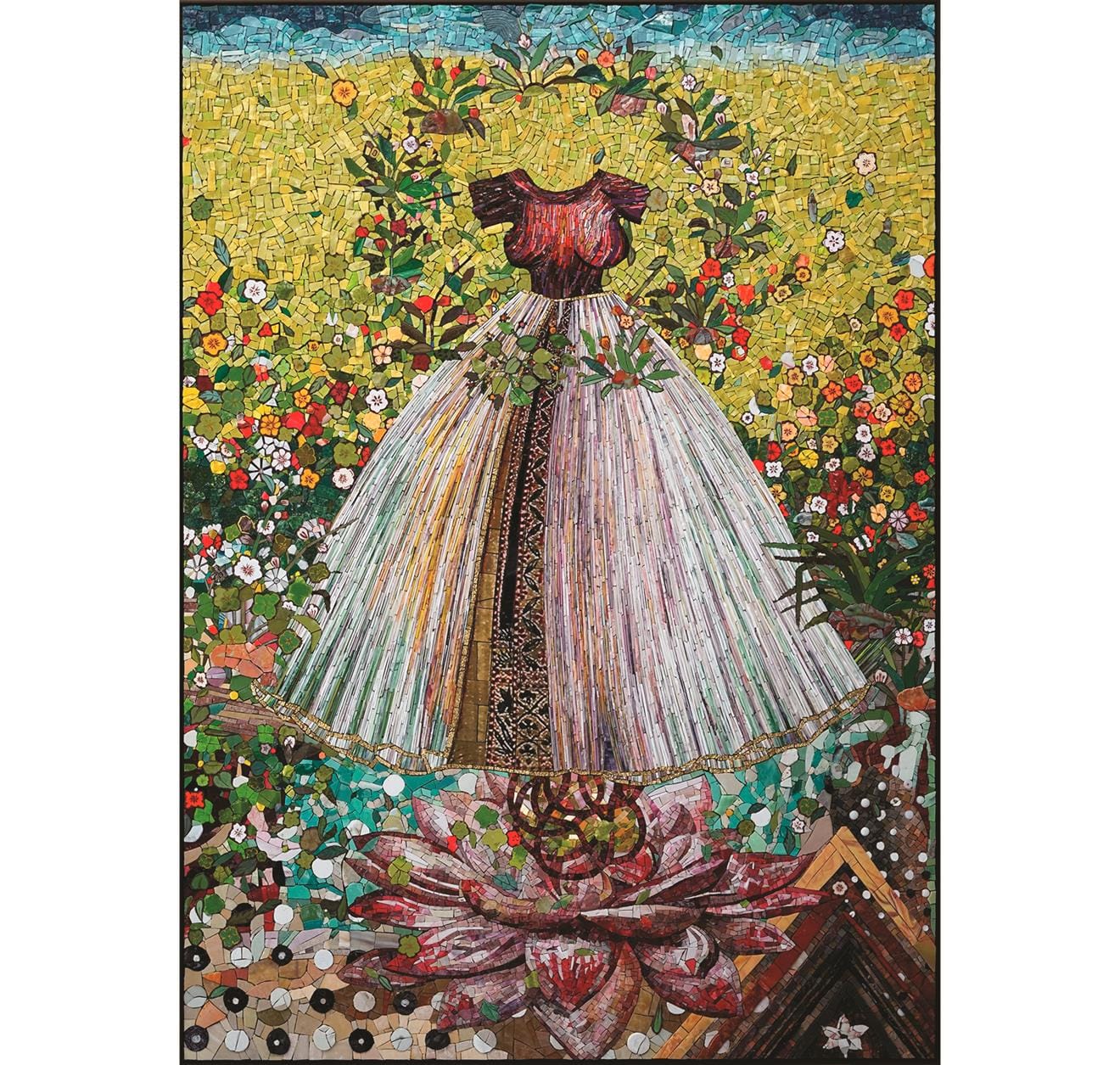
Sean Kelly is delighted to announce the second exhibition in our Los Angeles gallery, Shahzia Sikander’s Radiant Dissonance, which also marks the artist’s first solo exhibition in Los Angeles. This exhibition includes Sikander’s work in multiple mediums, including mosaic, sculpture, animated film, drawing, and a large-scale work on paper installation. The gallery will be open from 10am – 7pm on Saturday, November 19. The artist will be present for the reception from 5-7pm and a conversation with Ilene Chaiken at 6pm.
Drawing is central to Sikander’s practice and integral to all aspects of the work in the exhibition. For the artist, drawing implies movement both in time and across various forms. It is a means of imagining and bringing form to life, an armature of research to clarify ideas and connect thinking to gesture, action, and practice. There are connections, both literal and symbolic, in all of the works in the exhibition, such as the dialogues between representation and abstraction, text and image, glass and light, digital and hand, mosaic and animation, geometry and bodies, male and female; there are no binaries. It is the in-between space that is fecund, suggesting the unknown and untranslatable. As Sikander notes, “For me this idea of mystery is a guiding principle – a generative project. I see it as a resistance to the expected. It slows down the consumption of each work, keeping it open ended while being precise, making the viewer search for what can’t be found.”
Such a search is visualized in the opening of Sikander’s animated film Reckoning, 2020, in which two forms, mimicking warriors, are entangled in joust. The film, made from multiple drawings, reveals the cyclical theme of struggle through kinetic forms. Reflecting upon relationships that embody a moment of reckoning, such as between migrant and citizen, woman and power, human and nature, Sikander culls out a dramatic sequence of events in her restaging of an imaginary historical Indo-Persian-Turkish miniature painting. As art historian, Dorothy Price has observed, “In the unfolding of one short 4 minute and 16 second sequence, themes of creation, conflict, tension, colonialism, ecology, fertility, dark matter, and void across time and space are held in tension. The viewer is never allowed to rest over one or another but of necessity holds them all in the cyclical rhythm of Sikander’s expansive and mobile vision.”
In 2015, Sikander began creating mosaics, a direction motivated by the vibrant pixelization in her animated films. Touchstone, 2021, a captivating work by Sikander, depicts an Indian woman shown holding a chalawa (a type of ghost or spirit in Punjabi), which escapes her grasp and cannot be confined. The petals, branches, and tendrils that dance together at the ending of Reckoning are seen again in this work surrounding the figure. The chalawa, a recurring image throughout Sikander’s body of work, reaffirms the artist’s long-standing interest in challenging the conventions of Indian manuscript painting. With her mosaics, Sikander further dismantles the conventional scale of miniature painting as she changes the medium from ink to glass.
Sikander explores a wide range of iconographic symbolism with indeterminate possibilities and richly associative visual language to create her own visual narratives. The Infinite Woman series, 2021, and Gold & Diamond, 2021, are large drawings that hint at the redeeming potential of women’s bodies, juxtaposed against the extractive logic of global capitalism. Sikander’s first sculpture in bronze, Promiscuous Intimacies explores the intersection of multiple times, spaces, art historical traditions, bodies, desires, and subjectivities. The two female protagonists reference the goddess in Bronzino’s An Allegory with Venus and Cupid, and an Indian Devata figure in the collection of the Metropolitan Museum of Art.
Another key work in the exhibition, Epistrophe, 2021/2022 further anchors the centrality of drawing in Sikander’s practice. A large-scale work composed using fluid, spontaneous gestures, producing it involved Sikander’s entire body to amplify motifs that require a different kind of labor, skill, and pace than her smaller, intricate compositions. Regardless of scale, Sikander sees this work as very much in dialogue with classical drawing traditions. She notes, “There is no intention to hide anything… Everything is very visible; the paper is very transparent. It flows, it moves. All marks, including any flaws, become a part of the piece, which has no borders and can expand in any direction, marking a site that is unstable and multivalent.”
In January 2023, Shahzia Sikander will present two major new sculptures on the theme of justice in the exhibition, Havah… to breathe, air, life, in Madison Square Park, New York and on the Courthouse of the Appellate Division, First Department of the Supreme Court of the State of New York. The exhibition focuses on Sikander’s exploration of female representation in public sculptures and is her first major, site-specific outdoor sculptural exhibition.
A MacArthur Foundation award winner, Shahzia Sikander lives and works in New York City. She became a Fukuoka Laureate in 2022 as a recipient of the Arts and Culture Prize from Fukuoka, Japan. Sikander’s work was recently the subject of a traveling exhibition titled Shahzia Sikander: Extraordinary Realities, which opened at The Morgan Library, New York in June 2021 followed by the RISD Museum, Rhode Island in November 2021, and MFA Houston, Texas in March 2022.
Sikander’s innovative artistic practice led to her meteoric rise internationally in the mid-nineties with important survey exhibitions in 1998 at both the Renaissance Society at the University of Chicago, and the Kemper Museum of Contemporary Art, followed by solo exhibitions at the Hirshhorn Museum and Sculpture Garden in 1999, and the Whitney Museum of American Art in 2000. She has had major solo exhibitions throughout the world, including the Asian Art Museum, San Francisco; the Aga Khan Museum, Toronto; MAXXI | Museo nazionale delle arti del XXI secolo, Rome; the Asia Society Hong Kong Center, Hong Kong; the Guggenheim Museum, Bilbao; the Smithsonian American Art Museum, Washington D.C.; the Museum of Contemporary Art, Tokyo; the Irish Museum of Modern Art, Dublin; the Museum of Contemporary Art, Sydney; the Pérez Art Museum, Miami; and the San Diego Museum of Art, California, amongst others. Sikander has been included in international biennials such as the Lahore Biennale 01, Pakistan; the Karachi Biennale 17, Pakistan; the 6th Moscow Biennale of Contemporary Art, Manege, Russia; the 8th and 13th Istanbul Biennials, Turkey; the 5th Auckland Triennial, New Zealand; the Sharjah Biennale 11, Sharjah Art Foundation, UAE; the 51st and 54th International Art Exhibition of La Biennale di Venezia, Italy; and The Whitney Biennial, New York amongst others.
For additional information on Shahzia Sikander, please visit skny.com
Sean Kelly, Los Angeles
1357 N Highland Ave, Los Angeles, CA 90028, United States
